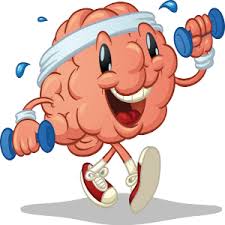Exercise Makes You Smarter!
We all know exercise is good for our heart, promotes weight loss, improves our mood, overall well-being, better muscle tone, balanced blood sugar (and much more), but did you know that exercise can also raise your I.Q.? Yes it does. In fact, a fitter you = a fitter brain. Any type of exercise, particularly aerobic activity has a beneficial impact on your ability to process and retain information. The good news? You don’t need to run a marathon to achieve markedly improved brain health – no matter what your age. Research now shows that brain and cognitive health can benefit from even very modest amounts of exercise and physical activity.

Exercise promotes better brain health in the following ways: Healthy blood flow means a healthier brain.
Have you ever felt better after a walk? Research shows that exercise markedly promotes healthy blood flow that effectively brings oxygen to your heart and the rest of your body, including your brain. With more oxygen circulating, you have healthier brain cells that result in improved cognition, increased alertness, attentiveness, and leading to faster learning. Dr. John Tatey, associate professor of psychiatry at Harvard Medical School says, “I like to say that exercise is like taking a little Prozac or Ritalin at just the right moment…it affects mood, vitality, alertness and feelings of well-being.”
A special hormone is triggered.
The hormone Irisin is triggered when we exercise. Researchers at Dana-Farber and Harvard Medical School have isolated a specific hormone, Irisin, released during exercise that improves cognition and protects the brain against degeneration. Irisin’s neuroprotective properties are what researchers believe is the main factor responsible for essentially making you smarter. By the way, Irisin has another beneficial role and that is its unique ability to take the white jiggly fat you may see and feel on your body and transform it to a special ‘brown fat’ that boosts metabolism and thus, resulting weight loss.
Exercise helps prevent brain shrinkage.
Exercising increases the size of an area of the brain called the Hippocampus that is critical for learning and memory. This area is highly active when working out, thereby enhancing mental activity. Research also shows exercises such as jogging, walking or dancing may also help to prevent the onset of Alzheimer’s and other types of dementia that show brain shrinkage. It is estimated that approximately 10% of adults over the age of 65 years have some form of cognitive impairment. Studies also show that the exercise duration of just 40 minutes a few times a week had significant benefit. One study showed that mice (who run naturally) that ran 3 miles each night, doubled the size of their hippocampus over a period of time. Perhaps the most important factor tied to brain health is the protein compound Brain-derived Neurotropic Factor (BDNF). Our brains contain 100 billion neurons and the health and functionality of our brain is highly influenced by BDNF. Exercise triggers more BDNF growth (especially in the hippocampus). Interestingly, high BDNF levels are tied to a lowered Alzhiemer’s risk.
Prevention is key: through exercise – especially aerobic, getting more vitamin D from the sun or through supplement form, and omega 3 fatty acids such as with wild salmon, chia seeds, walnuts or fish oil supplements and a healthful diet. All are scientifically proven methods to raise BDNF, We now have another very important reason to exercise: it can make you smarter as well as protect your brain and body throughout your life. You can’t put that in a pill.
To Your Good Health,
~Lori
© 2014 DLS HealthWorks, LLC. Lori Shemek, PhD, CNC, health and weight loss expert is the best-selling author of ‘Fire-Up Your Fat Burn!





